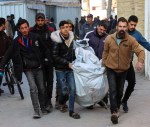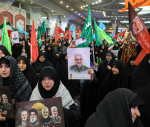You are here
Positive step forward
Oct 22,2015 - Last updated at Oct 22,2015
It was doubly satisfying to read last Sunday’s prominent American dailies The New York Times and The Washington Post, which carried articles about the raging Palestinian-Israeli conflict that has so far cost the lives of over 40 Palestinian youngsters and seven Israelis, some policemen or soldiers.
We rarely see such positive coverage, reflecting the views of Palestinians, so I wonder whether the articles are ushering in some even-handed reporting.
Jodi Rudoren’s opening paragraph in The New York Times noted that Arab “East Jerusalem, long the emotional heart of Palestinian life, is now the fiery soul of its discontent”.
She interviewed a Palestinian lecturer at Hebrew University, Fuad Abu Hamad, who runs two clinics in Israel’s health system and lives in a comfortable house among Sur Baher’s crowded hills.
The writer noted that “the view from his balcony is of sprawling enclaves that he said were “built on our lands” and the ugly barrier Israel erected that splits [his neighbourhood] from the occupied West Bank”.
“You have a lot of evidence that you are not a human being. The problem is the policy, because all the time as a Palestinian here you feel that they want to take you out of the city, you have a lot of problems that do not allow you to feel that you are part of the city. It’s killing from inside all the time,” Abu Hamad was quoted as saying.
Wrote Rudoren: “Israel captured all from Jordan in the 1967 war, expanded Jerusalem’s boundaries to 27 square miles from 2.3. Israel’s annexation was rejected by the United Nations, and most of the world considers the territory occupied.
“Today, 200,000 Jews live beyond Israel’s original border, most in new developments — widely considered illegal settlements — like those Mr Abu Hamad can see from his balcony, 2,000 scattered among the Palestinian enclaves.”
Her lengthy report concluded: “Yes, Mr Abu Hamad and his neighbours can fly from Israel’s airport, a privilege denied to those in the West Bank or Gaza. But he said he never makes it through security ‘without crying’, because his Hebrew University ID card ‘means nothing — I am a Palestinian in the end’.”
Under the title of the lead column in last Sunday’s Outlook (opinion) section of The Washington Post, “How Israel squandered its chance for peace”, Dan Ephron, a former Jerusalem bureau chief for Newsweek and the Daily Beast, chronicles the Israeli mistakes that followed the assassination by a “Jewish extremist” of Israeli prime minister Yitzhak Rabin in 1995.
He underlined that as Israel prepares to mark the 20th anniversary of Rabin’s assassination, the peace process which he championed “could not be in worse shape” as “the fresh wave of violence” has now engulfed the region.
The “signature” deal, he wrote, envisioned Israel’s gradual withdrawal from the occupied Palestinian territories “in exchange for peaceful relations with the Palestinians after nearly a century of conflict”.
But, he added, “after two decades of intermittent violence and relentless Israeli settlement expansion, it is now largely defunct.”
Consequently, Palestinian President Mahmoud Abbas announced last month that the Palestinians would no longer be bound by the Oslo accords.
Ephron writes that “the months that followed the murder were the worst of Peres’ 63-year career”, explaining that “thanks to a combination of national security gambles, inept campaign management and plain bad luck, Peres squandered his tailwinds” and “a litany of unnecessary mistakes cost him the election — and, with it, Israel’s best hope for peace”.
In his full-page article, Ephron listed Peres’ errors, opined that “Israelis had grown tired of peace conferences” and concluded that in the following Israeli elections, Israeli voters chose Netanyahu over Peres to lead the country with “the slimmest of margins”.
In other words, he concluded, “the greatest opportunity for peace had been squandered”.
Obvious is the astonishing failure of Arab governments to engage the American public in this decades-long conflict, even if through advertising, as supporters of Israel do, often telling their side of the conflict in an exaggerated or erroneous manner.
“The fact that two major American newspapers published these essays reveals a more growing awareness among editorial boards,” according to Jack G. Shaheen, a media analyst.
“The essays reflect awareness that current Israeli policies prevent peace efforts in the region,” he said, adding that “both writers merit our recognition as they debunk monolithic images of Israelis and American Jews”.
Zeina Azzam, the executive director of the Washington-based Jerusalem Fund, argues that “whether a full-fledged third Intifada or uprising is about to explode remains to be seen. What is clear, however, is that Israel’s continued military occupation of Palestinian land, and the denial of rights to the Palestinians living there, cannot remain the status quo and hold profound ramifications for both Palestinians and Israelis.”
It is time for the Arab-American community to learn how to effectively sell its side of the story to the media.
The writer is a Washington-based columnist.













